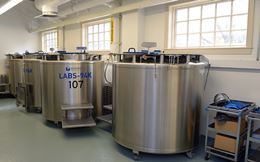 New induced pluripotent stem cell (iPSC) lines have been added to the National Human Genome Research Institute’s Sample Repository for Human Genetic Research (NHGRI Repository). These two iPSC lines are the first of their kind to be introduced to the collection.
New induced pluripotent stem cell (iPSC) lines have been added to the National Human Genome Research Institute’s Sample Repository for Human Genetic Research (NHGRI Repository). These two iPSC lines are the first of their kind to be introduced to the collection.
The new iPSC lines added to the NHGRI Repository:
ID Number | Collection | Population Descriptor |
Human Pangenome Reference Collection | African American People living in St. Louis, Missouri | |
Human Pangenome Reference Collection | African American People living in St. Louis, Missouri |
The samples chosen are part of the NHGRI Repository’s Human Pangenome Reference Collection, a collection of biological samples used by the Human Pangenome Reference Consortium. This group is assembling a new human “pangenome” as an update to the human reference genome first published in 2003. They are sequencing and assembling genomes from hundreds of people worldwide to establish a more diverse and, thus, complete reference genome.
Additional lines of iPSCs are expected to be added to the collection in the coming months. These lines will also be derived from cell lines from the Human Pangenome Reference Collection.
Induced pluripotent stem cells offer new opportunities for scientists to explore health and disease using a wide range of differentiated cell types. They are derived from blood cells, reprogrammed into this type of stem cell, and can then be coaxed into becoming nearly any type of cell in the body.
Coriell maintains, characterizes, banks, and distributes only the highest quality iPSCs. Its laboratories operate under the most stringent ISO 9001:2015 certified standard operating procedures, including the performance of quality control testing and assessment of pluripotency.
About the Coriell Institute for Medical Research
The Coriell Institute for Medical Research is a globally-recognized leader in biobanking and biomedical research. Coriell is home to one of the world's most important biobanks which distributes biological samples and offers research and biobanking services to scientists around the world. Coriell is the trusted steward of world-renowned collections for the National Institutes of Health, disease foundations and commercial clients. Also a leader in genomic and epigenomic research, Coriell is uncovering the ways our genetic makeup affects our health, especially with regard to cancer, aging, and personalized medicine. Coriell leads or participates in several research partnerships, including the Camden Cancer Research Center and the Camden Opioid Research Initiative. For more information, visit www.coriell.org, like Coriell on Facebook, or follow @Coriell_Science on Twitter.